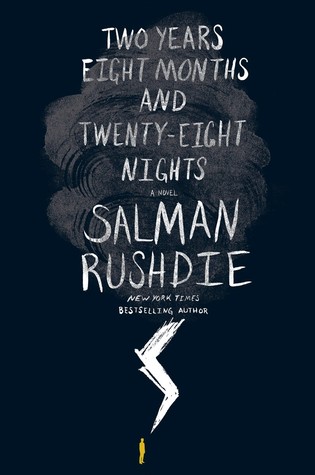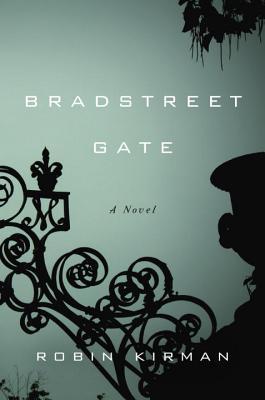**Two Years Eight Months and Twenty-Eight Nights by Salman Rushdie is out in two weeks on Tuesday, September 8th! Don't forget to pick it up from your favorite bookseller!**
Two Year Eight Months and Twenty-Eight Nights by Salman Rushdie. Random House Publishing; 2015. 304 pages. Ebook.
***I received an advanced copy of this book to read and review courtesy of NetGalley and Random House Publishing Group***
I consider myself to be a rather eclectic reader; I can enjoy something in almost any genre, and I can, in a rather chameleon-like fashion, alter my state of mind to various styles of writing. Unfortunately, I couldn't get myself to enjoy this particular novel.
As a result of this, I have officially decided that Salman Rushdie's writing is simply not for me. That is not to say that it is not wonderful writing, as Rushdie has a lovely prose with intricate stories and details, but rather that his writing is just not my type of writing. I have read Midnight's Children and I began (though was unable to finish) The Satanic Verses. I did enjoy Midnight's Children, but I never really fell in love with either of his works. I read both of those a while ago, so I figured I would give Rushdie one more go. Unlike Midnight's Children, there are not hundreds of made-up words that will confuse you - a huge relief to me, I assure you. Two Year Eight Months and Twenty-Eight Nights is classified as magical realism, but it has plenty of much more fantastical elements to satisfy any fantasy-lover out there.
In brief, Two Years Eight Months and Twenty-Eight Nights follows the story of Dunia, a jinn princess who, unlike normal jinn, falls in love with a mortal man and produces an abundance of offspring with him (seriously - we're talking births of ten to twenty kids at once here, supposedly) over two years, eight months, and twenty-eight nights. Eventually, years and years later, there is a great, unprecedented storm in New York that leaves the descendants of Dunia and her mortal man with strange powers: one man discovers he has begun to levitate off the ground and can longer put his own feet on solid ground; a baby is able to detect the corruption of any one person by merely touching them. All of this culminates in a struggle between dark and light forces, in which her descendants play a large and important part.
There are countless metaphors, symbolism, themes, and underlying messages that I think gives each reader the opportunity to dissect and devour it in their own way. Rushdie's prose is magical in itself: his words float along, perfectly capturing each moment before flowing smoothly into the next. Even in his long (very long), drawn-out informational lectures about the jinn, his words still read in a very lovely and elegant manner. It truly is magical novel, and the overall foundation of the novel is actually rather exciting and intriguing. I love hearing the details of the jinn and the overall fantasy/fairy story elements. Oh, and if there's one thing that one hundred percent, without a doubt understand and can take away from this story? The jinn really, really love sex.
The characters were hard for me to relate to. I felt a rather constant disconnect, and I felt more like an outsider viewing their stories from a great distance than actually being in and a part of their lives as I read along to find out what happens. Dunia is an intriguing character; the jinn don't normally feel many human-like emotions, nor do they generally consort with them, so she becomes unique in her relations with Ibn Rushd, her mortal lover. She tends to float back and forth between worlds, and provides a rather mysterious and complicated character for us to follow.
This is a dense book; the stories intermingle, the writing intermingles, and it continues to become more and more complex as it carries on. I found myself feeling confused and lost at multiple instances throughout the book. I honestly struggled to finish this, but something was tugging at me to carry on (plus, I knew I really wanted to write a review for it). The abundance of metaphors quickly become tangled up in one another, and I soon found myself losing interest at various points. The best way to describe my enjoyment of this novel is with the notion of random spurts of enthusiasm. I would be slogging through a particularly dense or uninteresting part, only to suddenly find myself enraptured in what was happening (I particularly enjoyed reading scenes with Mr. Geronimo). To me, this is a rather accurate depiction of the entire book: it has a somewhat random setup of involved scenes mixed with drier, more textbook-like informational writing. (Side note: I really love this cover, I think it adds a very simplistic yet symbolic image of the contents of the novel. It fits wonderfully - good job, designers!)
Overall, I am giving Two Year Eight Months and Twenty-Eight Nights three stars, as it was both intriguing and beautifully written, but also confusing and lacking in engagement. I would recommend this to any who loves mythology, fairy tales, fantasy, magical realism, or deep, complex novels that seem to thrive on in-depth story lines. However, as I mentioned above, I do think this particular novel requires a certain type of reader, though I would encourage anyone interested to give it a try - you might just love it.
Get more reviews in your inbox and subscribe to Forever Lost in Literature!





